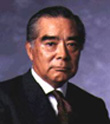New Trends in Global Communications: Towards Constant Interactive Exchange of Opinions
Yotaro KOBAYASHI (Chairman of the Board, Fuji Xerox Co., Ltd.)
 As a member of Japan's business community, I often attend international conferences abroad and on those occasions I cannot help but notice how little is known overseas about recent trends and public opinions in Japan. While it is certainly true that news can be more easily transmitted from Japan to other countries in this information age, risk is also increasing to have such reports on Japan overseas that misrepresent minority opinions as public opinions or local events as national events in Japan. As a member of Japan's business community, I often attend international conferences abroad and on those occasions I cannot help but notice how little is known overseas about recent trends and public opinions in Japan. While it is certainly true that news can be more easily transmitted from Japan to other countries in this information age, risk is also increasing to have such reports on Japan overseas that misrepresent minority opinions as public opinions or local events as national events in Japan.
Furthermore, since the terrorists' attacks on September 11, 2001, we have seen more news on terrorism in the U.S. and the war in Afghanistan, and much less on Japan than before in foreign media in general. If this trends continues, I am afraid that there will be more misinformation and misunderstanding on Japan overseas, and that might have negative effects on Japan's international relations in the future. It is, however, quite difficult to redress the balance just by expressing our opinions at occasional conferences abroad.
What we need to do is to disseminate information about representative opinions and recent trends in Japan and to exchange views with opinion leaders overseas on a more regular basis. One of the distinct characteristics of the Internet age is the fact that such activities can be conducted even by a single individual or by a small organization. In addition, we can make it two-way interactive exchange of information and mutually responsive to each other's opinions, rather than one-way dissemination of information that used to be the case.
Such interactive exchange of information has great merits for the Japanese, as exchange of views with opinion leaders overseas sometimes make us realize our biases or errors in our thinking. In order for us to carry out necessary social reform in the right direction, we need to explore and study global trends, if not global standards per se, by exchanging opinions with our counterparts overseas.
As far as I know, in Japan there are a number of individuals and organizations that have initiated such activities. For example, at the Center for Global Communications, International University of Japan (Executive Director Shumpei Kumon), a website called the "Global Communication Platform" (http://www.glocom.org) is set up to disseminate opinion leaders' views on Japan in English and to offer a place where foreign responses and discussions are posted.
Attempts are made to hold actual international conferences on such topics that have attracted much attention in those discussions, and summaries of contents at those conferences are posted to generate further discussions on the website. I myself participated as a keynote speaker in an international conference on "women and foreign nationals as new leaders in the information age" organized by the Center for Global Communications, and have received various responses and comments from within Japan and also from overseas, as summaries of my speech and panel discussions at the conference have been posted on the website.
There is little doubt that proliferation of this kind of activity is becoming increasingly important for Japan's international relations in the future. We all have to realize that constant exchange of information and opinions across national borders is the basis for global communications in the information age.
(The original Japanese version of this article was published in the January 12, 2002, issue of Nihon Keizai Shinbun.)
| 




